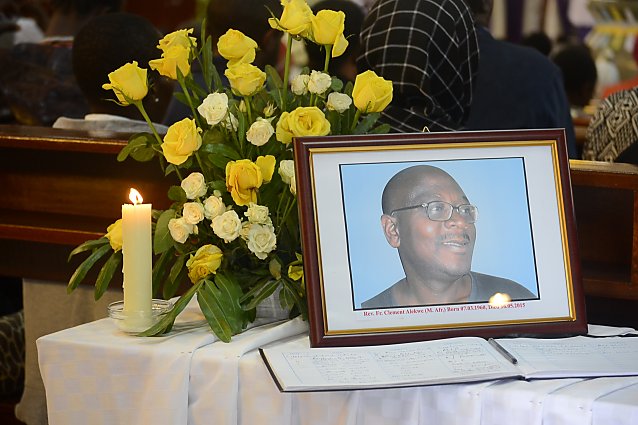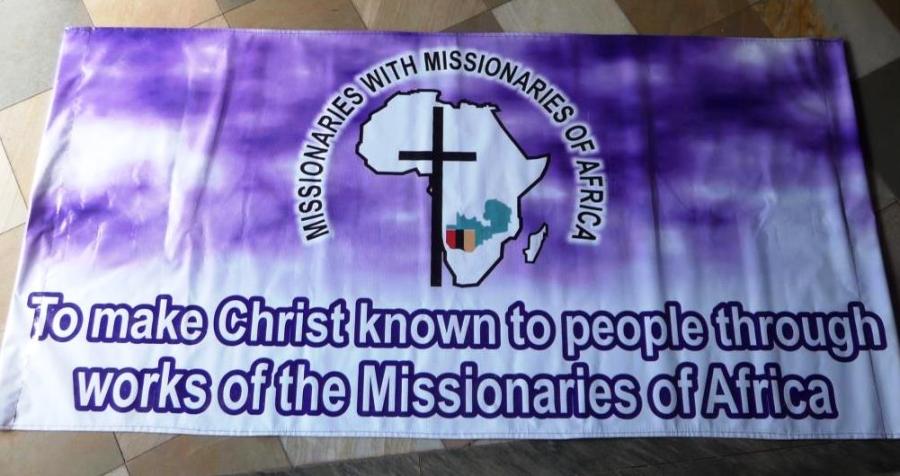 This article was written by a Canadian journalist about the situation our confreres are facing in Nigeria. It is good to know what newspapers are printing about us, as missionaries.
This article was written by a Canadian journalist about the situation our confreres are facing in Nigeria. It is good to know what newspapers are printing about us, as missionaries.
Par Mylène Moisan du journal La Presse+ Édition du 17 mai 2015, Section Actualité.
Quand Cyriaque Mounkoro est arrivé au Nigeria, il se demandait bien comment diable il allait parvenir à faire quoi que ce soit dans ce pays grugé par la corruption et la violence. Il ne se disait pas diable, mais plutôt bon Dieu. Le monsieur est un missionnaire, malien, père blanc, très gentil.
C’était en 2002, il venait d’être ordonné à Londres. « Mon premier choix, ce n’était pas le Nigeria. J’avais peur, comme les autres. » Il a rejoint deux autres missionnaires parachutés là pour faire du bien, peu importe comment.
La même année, Mohamed Yusuf fondait Boko Haram. Personne ne se méfiait, il y avait au pays des dizaines de milliers de prédicateurs comme lui.
Le Nigeria était déjà un invraisemblable bourbier : 170 millions d’habitants, 250 ethnies, 500 langues, le sud chrétien, le nord, musulman. « La première chose qui m’a frappé, c’est l’intégrisme religieux, autant chez les chrétiens que chez les musulmans. Il y avait des conflits entre les chrétiens modérés et les chrétiens intégristes, entre les chrétiens et les musulmans, et entre les musulmans modérés et les musulmans intégristes. »
Et Cyriaque, avec son col romain, au milieu de tout ça.
Il a écrit à son supérieur, non pas pour lui dire de le sortir de là au plus vite, mais pour lui dire exactement le contraire. « Je lui ai écrit que le Nigeria, c’était la meilleure expérience pour un missionnaire. C’est une zone de fractures, et elles sont multiples. Comme il y a des problèmes partout, il y a quelque chose à faire partout. »
Le genre de gars à voir le verre au tiers plein.
Cyriaque aurait pu se planter dans son église à Ibadan et attendre que les gens viennent l’entendre faire ses sermons sur l’importance de se parler, de faire fi des différences, des religions, des langues, des ethnies.
Il est facile de prêcher à des convertis.
Cyriaque a plutôt envoyé une lettre à Washington, où les Missionnaires d’Afrique ont un bureau de développement – je traduis littéralement « Development Office » –, qui finance toutes sortes de projets des missionnaires sur le terrain. Cyriaque voulait s’attaquer à un autre problème insoluble du pays, l’accès à l’eau potable.
Plus du tiers des Nigérians n’y ont pas accès. Ça donne 63 millions de personnes, et environ 4 % des enfants de moins de cinq ans qui meurent de dysenterie. En 2014, Boko Haram a sauvagement tué plus de 4000 personnes. Le manque d’eau et les épouvantables conditions d’hygiène, 73 000.
Cyriaque a eu une idée.
« Je me suis servi du financement de projets pour promouvoir le dialogue. Pour qu’un projet soit accepté, il fallait que les gens de la communauté s’assoient ensemble et qu’ils parviennent à un consensus. »
 — Cyriaque Mounkoro
— Cyriaque Mounkoro
Pas de consensus, pas d’eau.
« Si la demande venait d’un seul groupe, elle était refusée. La population devait surmonter les différences ethniques et religieuses, et se mettre d’accord pour établir un programme d’entretien et de rentabilité. Je leur disais : si vous voulez de l’eau, vous devez vous parler. Des fois, ça pouvait prendre six mois, neuf mois, un an, juste pour qu’ils arrivent à s’asseoir ensemble. »
Ils ont réussi 25 fois, un peu partout au pays, au nord comme au sud. « En faisant ça, je n’ai pas besoin de leur parler pendant une heure de l’amour du prochain. Les grands discours préparés avec soin sur le dialogue, sur l’importance de combattre la corruption, ça porte moins de fruits que ça… »
C’est une goutte d’eau dans une mare de sang.
Dans un rapport qu’il a produit pour le bureau de Washington qui a financé les 25 projets, Cyriaque en profite pour poser un diagnostic sur le pays. « Dans l’histoire du Nigeria, le tribalisme, la religion et la politique ont été les trois vers qui ont affaibli l’unité de la société. » Et qui ont engendré Boko Haram.
Ainsi, pendant que les quelques pères blancs faisaient forer des puits, Boko Haram a éliminé 13 000 personnes et en a fait fuir 1,5 million. Cyriaque et les autres missionnaires ont dû composer avec la mort – et surtout la peur – que le groupe semait sur son passage. « En 2013, on devait ordonner un père dans un village. Une semaine avant, des gens sont venus brûler le village et égorger les chrétiens… »
Les membres de Boko Haram ne sont plus vraiment regardants, ils tuent aussi les musulmans qui ne sont pas des fous d’Allah. « Quand des musulmans sont tués, les gens prennent conscience que ce n’est pas juste contre les chrétiens. Il y a des leaders qui commencent à se lever… »
Cyriaque était de passage à Québec récemment pour une retraite. Il a quitté le pays en août dernier, après 13 ans. « Je pars avec deux sentiments contradictoires. Le premier, c’est que les Nigérians sont de nature très chaleureuse, ils sont très généreux et ils ont un sens de l’hospitalité incroyable. Mais, en même temps, il y a un niveau inouï d’insécurité, du banditisme, des gens qu’on égorge comme des animaux, pour l’argent ou pour Dieu. »
Cyriaque a été kidnappé en décembre 2008 par une douzaine de jeunes. Il a été chanceux, c’était pour l’argent. Quand c’est pour Dieu, ça ne pardonne pas.
9.081999
8.675277
 The Bishop of Karonga Diocese,
The Bishop of Karonga Diocese,









